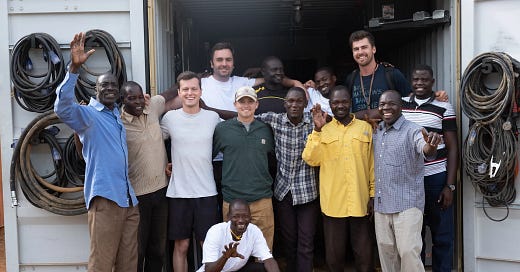Last night, I attended a fundraising event for a nonprofit called JustCause. It wasn’t the sort of evening where you just write a check, smile politely, and move on. It was a moment where a floodlight turned on, illuminating the incredible impact a small organization can have when driven by passion and resourcefulness.
JustCause, in essence, builds water towers and wells in Uganda. But it’s not just about infrastructure. They’re teaching local communities how to build these projects themselves, passing on skills that ripple out into even greater impact. I listened as the founders, inventors, and builders—people who probably spend more time welding than giving speeches—described how they first came together, not to start a nonprofit, but just to solve a problem.
That’s what hit me hardest. They never set out to be a nonprofit; they simply saw a need and decided to fill it. And the result? Men and women who had never experienced running water in their lives now not only have access to it but have also learned to build and maintain the systems that provide it. It’s a beautiful cycle: teach someone to build one well, and they’ll go on to create four more.
The founders’ humility was infectious, but their challenges were glaring. These are people who are exceptional at making things—designing, building, innovating—but as they admitted, they’re not paperwork people. They’ve never written a grant or known where to start looking for one. Yet a single $7,000 grant could finish a water station, complete with a solar-powered roof. That’s it. $7,000.
This was where I got really excited, realizing how my team and I at Vincent could step in. We’ve been developing tools to help organizations navigate the tricky world of grant writing and fundraising. Tools that could take the guesswork out of finding the right grants or even automate the process of drafting proposals. Sitting there, I couldn’t stop thinking about how many more water towers JustCause could build if they had a little extra help on the operational side.
And it’s not just about Uganda or water towers. The real magic is their model: empowering others to solve their own problems. What if they could scale this model to other countries, other needs? It’s a big question, but one that suddenly feels within reach with the right support.
Listening to the founders speak also reminded me of how much I’ve missed in my years immersed in corporate life. It’s easy to get tunnel vision, focusing on quarterly goals and bottom lines, forgetting about the immense good happening in the world. But last night, I saw a glimpse of it—a moment where the boundaries between countries and cultures blurred, replaced by shared purpose and humanity.
What struck me most was the founders’ eagerness not for recognition but for partnership. They don’t want to stop welding and inventing to tackle spreadsheets and paperwork. They want to keep doing what they do best: building solutions and changing lives. That’s where people like us come in. We can pick up the pieces they don’t have time for and help amplify their impact.
This experience left me brimming with hope—not just for JustCause but for all the small, scrappy organizations out there solving problems in ways that most of us have never even thought about. Their stories matter. Their missions are inspiring. And their work reminds me that while I may not be out there building water towers, I have my own skills to bring to the table.
Sometimes, the most profound change starts with a spark. And if we can lend a little oxygen to those sparks, who knows how far the fire will spread?
Link Time!



